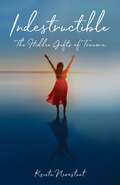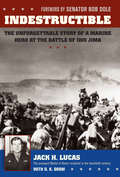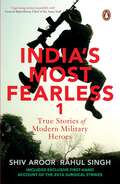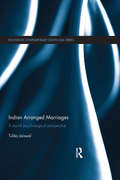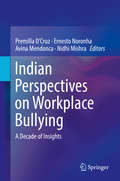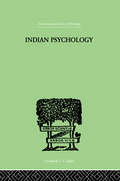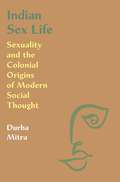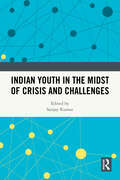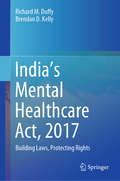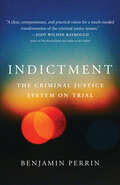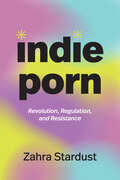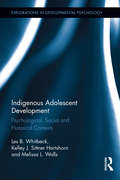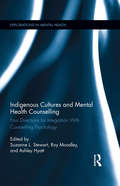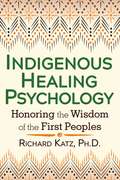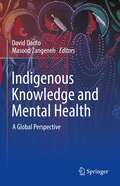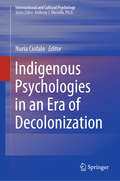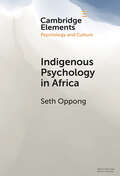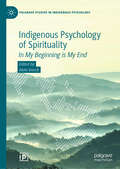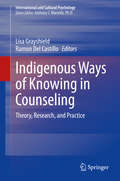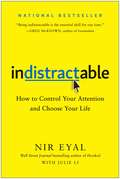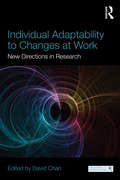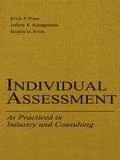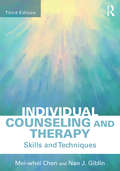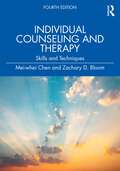- Table View
- List View
Indestructible: The Hidden Gifts of Trauma
by Krista NerestantWelcome to Krista Nerestant’s journey from the other side of the globe—the islands of the Philippines—to the United States of America. Indestructible is where she shares the hidden gifts of trauma that have empowered her to not only survive but also thrive in a life most would have given up on. Krista was a traumatized overachiever bound by the cultural and societal limitations of her home country. But coming out as a spiritual medium exposed the many resources she had in her arsenal, inspiring her to embark on a healing journey. In Indestructible, she shares how she learned to extract life-healing lessons while overcoming a violent past, with the hope of inspiring and teaching survivors to approach personal wounds as a gateway to unleashing their self-actualization. Her story will stimulate you mentally, physically, emotionally, and spiritually—but most of all, it will lead you to start your own journey of self-discovery and uncover your very own hidden gifts of trauma.
Indestructible: The Unforgettable Story of a Marine Hero at Iwo Jima
by Jack Lucas D. K. DrumDuring the battle of Iwo Jima, two enemy grenades landed close to Jack Lucas and his buddies. Jack threw himself on one of the grenades, grabbed the second, and pulled it beneath his body. His buddies were saved, but Lucas was badly injured. Miraculously, he survived-but just barely. For this brave action seventeen-year-old Jack Lucas from North Carolina became the youngest Marine in history to receive the Medal of Honor. Indestructible reveals the rocky road that led Jack Lucas to Iwo Jima, his arduous recovery, and the obstacles Jack overcame later in life. Jack’s moving and powerful memoir is a testament to America’s greatest generation.
India's Most Fearless True Stories of Modern Military Heroes: True Stories Of Modern Military Heroes
by Rahul Singh Shiv AroorThe Army major who led the legendary September 2016 surgical strikes on terror launch pads across the LoC; a soldier who killed 11 terrorists in 10 days; a Navy officer who sailed into a treacherous port to rescue hundreds from an exploding war; a bleeding Air Force pilot who found himself flying a jet that had become a screaming fireball . . . Their own accounts, or of those who were with them in their final moments. India's Most Fearless covers fourteen true stories of extraordinary courage and fearlessness, providing a glimpse into the kind of heroism our soldiers display in unthinkably hostile conditions and under grave provocation.
Indian Arranged Marriages: A Social Psychological Perspective (Routledge Contemporary South Asia Series)
by Tulika JaiswalDespite the fact that more than 80% of cultures practice varying degrees of arranged marriage, scholars have thus far concentrated exclusively on American and European cultures from choice marriages, not yet fully exploring the psychology of arranged marriages. India is a prominent South Asian nation that continues to retain the historical tradition of arranged marriages in the 21st century. This book therefore provides a timely addition to marital research as it offers a comprehensive and systematic psychological examination on Indian arranged marriages. This book explores the role of individual, interactional, contextual, and cultural factors in predicting marital satisfaction in individuals who were in arranged marriages and living in India. The discussion is drawn from a survey collecting data from individuals married through the arranged marriage system in India. In light of this empirical study, the book considers the cross-cultural applicability of Western findings and proposes some key methodological and clinical considerations for examining marital relationships in Indian arranged marriages. Providing useful, much-needed scholarly insight on arranged marriages and widening the research conceptualization of marriage, this book will be of particular interest to scholars of Social Psychology, Sociology, Marital and Cross-cultural studies.
Indian Perspectives on Workplace Bullying: A Decade of Insights
by Premilla D'Cruz Ernesto Noronha Avina Mendonca Nidhi MishraThis book, recognizing that workplace bullying is a significant employment relations and occupational health and safety problem in India which warrants urgent and holistic intervention, presents empirical studies examining contextual factors, antecedents, mediators, moderators, processes, outcomes and solutions, thereby deepening our understanding of the phenomenon. The chapters showcased in the volume emphasize the paradoxical Indian sociocultural ethos whose simultaneous embrace of humanism versus identity-based, personalized and hierarchical relationships, materialism versus spiritualism and individualism versus collectivism both fuel yet quell misbehaviour. The inquiries which constitute this book engage both positivist and postpostivist paradigms, draw on several theoretical and substantive frameworks, utilize an array of methods, investigate numerous foci and cover various geographical regions in India, a range of industrial sectors and all levels of the organization. In so doing, they make pathbreaking contributions beyond country-specific insights to advance the frontiers of the thematic area worldwide. The chapters include important findings pertaining to digital workplaces, child labour, forgiveness, customer bullying, psychological contract violation, perceived organizational support, psychological capital and comprehensive prevention strategies encompassing psychosocial risks. As well as building on a decade of knowledge about workplace bullying in India, the book puts forward a research agenda on the topic for the subcontinent in particular and the field in general. The volume is of interest to researchers, practitioners and students of organizational studies, human resource management, industrial relations, labour law, corporate law, health sciences and social work.
Indian Psychology Perception: Cognition; Emotion And Will; Epistemology Of Perception (Psychology Ser.)
by Sinha, JadunathFirst Published in 1999. Routledge is an imprint of Taylor & Francis, an informa company.
Indian Sex Life: Sexuality and the Colonial Origins of Modern Social Thought
by Durba MitraDuring the colonial period in India, European scholars, British officials, and elite Indian intellectuals—philologists, administrators, doctors, ethnologists, sociologists, and social critics—deployed ideas about sexuality to understand modern Indian society. In Indian Sex Life, Durba Mitra shows how deviant female sexuality, particularly the concept of the prostitute, became foundational to this knowledge project and became the primary way to think and write about Indian society.Bringing together vast archival materials from diverse disciplines, Mitra reveals that deviant female sexuality was critical to debates about social progress and exclusion, caste domination, marriage, widowhood and inheritance, women's performance, the trafficking of girls, abortion and infanticide, industrial and domestic labor, indentured servitude, and ideologies about the dangers of Muslim sexuality. British authorities and Indian intellectuals used the concept of the prostitute to argue for the dramatic reorganization of modern Indian society around Hindu monogamy. Mitra demonstrates how the intellectual history of modern social thought is based in a dangerous civilizational logic built on the control and erasure of women's sexuality. This logic continues to hold sway in present-day South Asia and the postcolonial world.Reframing the prostitute as a concept, Indian Sex Life overturns long-established notions of how to write the history of modern social thought in colonial India, and opens up new approaches for the global history of sexuality.
Indian Youth in the Midst of Crisis and Challenges
by Sanjay KumarOver one-third of the Indian population is made up of young people aged between 15 and 34 years. Such a large, young population is an asset to any nation, but today, young Indians are grappling with multifarious challenges hindering their growth. This book analyses factors that influence the youth’s decision-making processes, their navigation of societal norms, education choices, identity formation, and the evolving perceptions of tradition and modernity. It focuses on the changing patterns of marriage among the Indian youth, the challenges posed by the COVID-19 pandemic, and the ongoing changes in youth transitions and social reproduction in a modern society. The findings presented in the book provide crucial insights into how young Indians perceive their roles within their families, communities, and the broader society. The volume also offers valuable guidance on how to support and empower the next generation to build a resilient and prosperous future.Lucid, accessible, and empirically grounded, the book is indicative of the momentum and direction of change in the country. It will be useful to scholars and researchers of sociology, political sociology, political studies, youth psychology and anthropology. It will also be of interest to policymakers, journalists, and the interested general reader.
India’s Mental Healthcare Act, 2017: Building Laws, Protecting Rights
by Brendan D. Kelly Richard M. DuffyThis book comprehensively discusses the background to the passing of India's revolutionary Mental Healthcare Act, 2017, offering a detailed description of the Act itself and a rigorous analysis in the context of the CRPD and the World Health Organization (WHO) standards for mental health law. It examines the fine balance, between complying with the CRPD while still delivering practical, humane, and implementable legislation. It explores how this legislation was shaped by the WHO standards and provides insights into areas where the Indian legislators deviated from these guidelines and why. Taking India as an example, it highlights what is possible in other low- and middle-income countries. Further it covers key issues in mental health, identifying potential competing interests and exploring the difficulties and limitations of international guidelines.The book is a valuable resource for psychiatrists, nurses, social workers, non-governmental organizations and all mental healthcare workers in India and anyone studying human rights law.
Indictment: The Criminal Justice System on Trial
by Benjamin PerrinBased on first-hand interviews with survivors, people who have committed offences, and others on the frontlines, Indictment puts the Canadian criminal justice system on trial and proposes a bold new vision of transformative justice. #MeToo. Black Lives Matter. Decriminalize Drugs. No More Stolen Sisters. Stop Stranger Attacks. Do we need more cops or to defund the police? Harm reduction or treatment? Tougher sentences or prison abolition? The debate about Canada’s criminal justice system has rarely been so polarized – or so in need of fresh ideas. Indictment brings the heartrending and captivating stories of survivors and people who have committed offences to the forefront to help us understand why the criminal justice system is facing such an existential crisis. Benjamin Perrin draws on his expertise as a lawyer, former top criminal justice advisor to the prime minister, and law clerk at the Supreme Court of Canada to investigate the criminal justice system itself. Indictment critiques the system from a trauma-informed perspective, examining its treatment of victims of crime, Indigenous people and Black Canadians, people with substance use and mental health disorders, and people experiencing homelessness, poverty, and unemployment. Perrin also shares insights from others on the frontlines, including prosecutors and defence lawyers, police chiefs, Indigenous leaders, victim support workers, corrections officers, public health experts, gang outreach workers, prisoner and victims’ rights advocates, criminologists, psychologists, and leading trauma experts. Bringing forward the voices of marginalized people, along with their stories of survival and resilience, Indictment shows that a better way is possible.
Indie Porn: Revolution, Regulation, and Resistance (a Camera Obscura book)
by Zahra StardustIn Indie Porn, Zahra Stardust examines the motivations and interventions of independent porn producers as they navigate criminal laws, risk-averse platforms, discriminatory algorithms, and rampant piracy. Herself a porn performer and participant, Stardust takes readers behind the scenes, offering intimate insights into this sociopolitical movement. She finds politicians who watch porn in parliament, protesters leading face-sitting demonstrations, sex workers making COVID-safe pornography, and artists reverse-engineering porn detection software. Against the backdrop of a global gig economy, Stardust documents the promises of indie porn to democratize content, revolutionize production, and redistribute wealth while outlining the fantasies of regulators, whose illusions of what porn is and does foreclose possibilities for transformation. Inevitably, as these paradigms collide, porn producers engage in creative tactics to hustle for survival and visibility, from ethical certification to law reform, sometimes reproducing hierarchies of stigma themselves. By highlighting how porn stigma is bound up with intersecting oppressions, Stardust identifies these junctions as coalitional opportunities for changing social relationships to sex, work, and capitalism.
Indigenous Adolescent Development: Psychological, Social and Historical Contexts (Explorations in Developmental Psychology)
by Les B. Whitbeck Melissa Walls Kelley HartshornThis volume explores the first four waves of a longitudinal diagnostic study of Indigenous adolescents and their families. The first study of its kind, it calls attention to culturally specific risk factors that affect Indigenous (American Indian and Canadian First Nations) adolescent development and describe the historical and social contexts in which Indigenous adolescents come of age. It provides unique information on ethical research and development within Indigenous communities, psychiatric diagnosis at early and mid-adolescence, and suggestions for putting the findings into action through empirically-based interventions.
Indigenous Cultures and Mental Health Counselling: Four Directions for Integration with Counselling Psychology (Explorations in Mental Health #16)
by Roy Moodley Suzanne L. Stewart Ashley HyattNorth America’s Indigenous population is a vulnerable group, with specific psychological and healing needs that are not widely met in the mental health care system. Indigenous peoples face certain historical, cultural-linguistic and socioeconomic barriers to mental health care access that government, health care organizations and social agencies must work to overcome. This volume examines ways Indigenous healing practices can complement Western psychological service to meet the needs of Indigenous peoples through traditional cultural concepts. Bringing together leading experts in the fields of Aboriginal mental health and psychology, it provides data and models of Indigenous cultural practices in psychology that are successful with Indigenous peoples. It considers Indigenous epistemologies in applied psychology and research methodology, and informs government policy on mental health service for these populations.
Indigenous Healing Psychology: Honoring the Wisdom of the First Peoples
by Richard KatzConnecting modern psychology to its Indigenous roots to enhance the healing process and psychology itself • Shares the healing wisdom of Indigenous people the author has worked with, including the Ju/’hoansi of the Kalahari Desert, the Fijians of the South Pacific, Sicangu Lakota people, and Cree and Anishnabe First Nations people • Explains how Indigenous perspectives can help create a more effective model of best practices in psychology • Explores the vital role of spirituality in the practice of psychology and the shift of emphasis that occurs when one understands that all beings are interconnected Wherever the first inhabitants of the world gathered together, they engaged in the human concerns of community building, interpersonal relations, and spiritual understanding. As such these earliest people became our “first psychologists.” Their wisdom lives on through the teachings of contemporary Indigenous elders and healers, offering unique insights and practices to help us revision the self-limiting approaches of modern psychology and enhance the processes of healing and social justice. Reconnecting psychology to its ancient roots, Richard Katz, Ph.D., sensitively shares the healing wisdom of Indigenous peoples he has worked with, including the Ju/’hoansi of the Kalahari Desert, Fijians native to the Fiji Islands, Lakota people of the Rosebud Reservation, and Cree and Anishnabe First Nations people from Saskatchewan. Through stories about the profoundly spiritual ceremonies and everyday practices he engaged in, he seeks to fulfill the responsibility he was given: build a foundation of reciprocity so Indigenous teachings can create a path toward healing psychology. Also drawing on his experience as a Harvard-trained psychologist, the author reveals how modern psychological approaches focus too heavily on labels and categories and fail to recognize the benefits of enhanced states of consciousness. Exploring the vital role of spirituality in the practice of psychology, Katz explains how the Indigenous approach offers a way to understand challenges and opportunities, from inside lived truths, and treat mental illness at its source. Acknowledging the diversity of Indigenous approaches, he shows how Indigenous perspectives can help create a more effective model of best practices in psychology as well as guide us to a more holistic existence where we can once again assume full responsibility in the creation of our lives.
Indigenous Knowledge and Mental Health: A Global Perspective
by Masood Zangeneh David DantoThis book brings together Indigenous and allied experts addressing mental health among Indigenous peoples across the traditional territories commonly known as the Americas (e.g. Canada, US, Caribbean Islands, Mexico, Bolivia, Venezuela, Ecuador and Brazil), Asia (e.g. China, Korea, Japan, Taiwan and Indonesia), Africa (e.g. South Africa, Central and West Africa) and Oceania (New Guinea and Australia) to exchange knowledge, perspectives and methods for mental health research and service delivery. Around the world, Indigenous peoples have experienced marginalization, rapid culture change and absorption into a global economy with little regard for their needs or autonomy. This cultural discontinuity has been linked to high rates of depression, substance abuse, suicide, and violence in many communities, with the most dramatic impact on youth. Nevertheless, Indigenous knowledge, tradition and practice have remained central to wellbeing, resilience and mental health in these populations. Such is the focus of this book.
Indigenous Psychologies in an Era of Decolonization (International and Cultural Psychology)
by Nuria CiofaloThis groundbreaking volume explores the capacity of Indigenous psychologies to counter the effects of longstanding colonization on traditional cultures and habitats. It chronicles the editor’s extensive research in the Lacandon Rainforest in southern Mexico, illustrating respectful methodologies and authentic friendship—a decolonized approach by a committed scholar—and the concerted efforts of community members to preserve their history and heritage. Descriptions of collaborations among children, parents, students, and elders demonstrate the continued passing on of indigenous knowledge, culture, art, and spirituality. This richly layered narrative models cultural resilience and resistance in their transformative power to replace environmental and cultural degradation with co-existence and partnership.Included in the coverage:• Indigenous psychologies: a contestation for epistemic justice. • The ecological context and the methods of inquiry and praxes.• Environmental impact assessment of deforestation in three communities of the Lacandon Rainforest.• Public policy development for community and ecological wellbeing. • Oral history, legends, myths, poetry, and images. With stirring examples to inspire future practices and policies, Indigenous Psychologies in an Era of Decolonization will take its place as a bedrock text for indigenous psychology and community psychology researchers. It speaks needed truths as the world comes to grips with pressing issues of environmental preservation, restorative justice for marginalized peoples, and the waging of peace over conflict.
Indigenous Psychology in Africa: A Survey of Concepts, Theory, Research, and Praxis (Elements in Psychology and Culture)
by Seth OppongUnderstanding human behaviour, thoughts, and emotional expressions can be challenging in the global context. Due to cultural differences, the study of psychology cannot be de-contextualised. This calls for unearthing of the explanatory systems that exist in Africa to understand and account for behaviour, emotions, and cognition of Africans. This call is addressed through the emergence of African Psychology (AP) or Indigenous Psychology in Africa (IPA) as a legitimate science of human experience. This Element discusses the motivations for AP, centrality of culture, demarcations of AP, and the different strands within AP. It highlights issues related to African philosophy, African cultural anthropology, African philosophy of science, and suitable methodological approaches for AP research. It also discusses some selected theoretical contributions and applications of AP. The Element concludes that AP researchers and practitioners need to pursue interdisciplinarity and avoid meaningless rejection of good ideas from other cultural settings.
Indigenous Psychology of Spirituality: In My Beginning is My End (Palgrave Studies in Indigenous Psychology)
by Alvin DueckThis book presents cutting-edge research and theory in the emerging field of the indigenous psychology of religion. Its authors examine the influence of colonization and illustrate the use of novel research methodologies utilised in studies with communities in India, Korea, China, Indonesia, America, and Poland. Whereas Western psychology has traditionally viewed religion through an institutional lens and from a Euro-American perspective, this book aims to facilitate an understanding of indigenous spiritualities on their own terms and from the indigenous people’s lived experience. In doing so, the contributors seek to support indigenous communities in the recovery of their voice, original vision, and ancient practices, and to follow their yearning as echoed in T. S. Eliot’s words: “In my beginning is my end.” The book is replete with examples of this recovery of indigeneity in, for example, Chinese notions of harmony and resilience; cultural differences in hearing the voice of the divine; the influence of animism on Christians in Korea; and in savoring the bereavement of loved ones. This novel collection presents fresh insights for students and scholars of the psychology of religion, indigenous studies, cultural psychology, and anthropology.
Indigenous Ways of Knowing in Counseling: Theory, Research, and Practice (International and Cultural Psychology)
by Lisa Grayshield Ramon Del CastilloIndigenous Counseling is based in universal principals/truths that promote a way to think about how to live in the world and with one another that extends beyond the scope of Western European thought. Individual health and wellness is intricately interwoven into the relationships that we establish on multiple levels in our lives, those that we establish with ourselves, with others, and with the external environments with which we live. From an Indigenous perspective, health and wellness in our individual lives, families, community and world, is the result of ancient knowledge that produces action in a way that is beneficial to all beings on the planet for generations to come. The current social and political record of our country now clearly reveals the result of a paradigm that has outlived its time. No longer can we ignore the core values of our fields of study; we must take a deeper look into the academic endeavors that inform the way we pass our cultures’ values on to successive generations. While it has taken Western Science decades to catch up to Indigenous/Native Science, we now have ample scientific evidence to support claims of interconnectedness on multiple levels of individual and collective health.
Indirect Parenting Interventions, Neuroscience and the Parent-Child Relationship: Second-Order Parenting
by Thomas W. RobertsThis volume explores indirect parenting behavior that changes the structure of the parent-child relationship, examining the ecological dimension of parenting in addition to nurturance and control.Drawing on neuroscientific research in parenting, it provides a model for how children learn implicitly and how parents can relate to children through indirect means. Roberts argues that first-order parenting techniques, teaching specific behaviors to reduce unwanted child behaviors, are overused. He examines and offers guidance on how indirect interventions that place emphasis on the interactional components of the parent/child relationship, such as modelling, storytelling, reframing, humor, and paradox, can support parents and children in developing positive relationships. • Addresses the latest brain research and its application to parent/child interactions• Introduces the student to aspects of the parent/child relationship that are not covered in most courses• Useful to clinicians who work directly with parents • Offers a perspective on parenting that differs from most parenting models• Facilitates awareness of how unconscious and nonverbal communication affects parenting• Serves to deepen the relationship with the child and curb unwanted behaviorIndirect Parenting Interventions, Neuroscience and the Parent-Child Relationship will be thought-provoking reading for students and scholars of parenting and family systems, as well as clinicians who work directly with parents giving them a broader perspective in dealing with parent/child interactions.
Indistractable
by Nir EyalYou sit down at your desk to work on an important project, but a notification on your phone interrupts your morning. Later, as you're about to get back to work, a colleague taps you on the shoulder to chat. At home, screens get in the way of quality time with your family. Another day goes by, and once again, your most important personal and professional goals are put on hold. <p><p> What would be possible if you followed through on your best intentions? What could you accomplish if you could stay focused? What if you had the power to become "indistractable?" <p> International bestselling author, former Stanford lecturer, and behavioral design expert, Nir Eyal, wrote Silicon Valley's handbook for making technology habit-forming. Five years after publishing Hooked, Eyal reveals distraction's Achilles' heel in his groundbreaking new book. <p> In Indistractable, Eyal reveals the hidden psychology driving us to distraction. He describes why solving the problem is not as simple as swearing off our devices: Abstinence is impractical and often makes us want more. <p> Eyal lays bare the secret of finally doing what you say you will do with a four-step, research-backed model. Indistractable reveals the key to getting the best out of technology, without letting it get the best of us.
Individual Adaptability to Changes at Work: New Directions in Research (Organization and Management Series)
by David ChanIndividual adaptability to changes at work refers to an individual’s response to new demands or ill-defined problems created by uncertainty, complexity, mergers, and any rapid change in the work situation. Today, one of the key factors for an individual’s success is said to be adaptability. In the past two decades there has been increasing interest in the research on individual adaptability, and this is one of the first academic volumes to look at this important topic. Specific contexts examined include work-family conflict, retirement, career management and intercultural interaction at the workplace. The book will provide a comprehensive and integrated analysis of the conceptual, assessment and contextual issues that will help identify the current trends and emerging themes in adaptability research.
Individual Assessment: As Practiced in Industry and Consulting (Applied Psychology Series)
by Kristin O. Prien Jeffery S. SchippmannIndividual Assessment is a professional practice important to Human Resource Managers, Executives and anyone making decisions about employees. Finally, we now have a clear, practical guide with methodologically-grounded descriptions of how to successfully do it. The authors have put together a unique new book with the following key features: *case studies and applied examples showing "how to" conduct individual assessment; *the book provides the reader with a conceptual structure and the research and literature supporting the process; and * it can be used as a text or supplemental text in courses on Personnel Selection, Assessment, Human Resources and Testing. This book will take Individual Assessment to an entirely new level of understanding and practice, and into a new era of professional research and activity.
Individual Counseling and Therapy: Skills and Techniques
by Nan J. Giblin Mei-whei ChenIndividual Counseling and Therapy, 3rd edition, goes beyond the typical counseling textbook to teach the language of therapy from the basic to the advanced. Lucidly written and engaging, this text integrates theory and practice with richly illustrated, real-life case examples and dialogues that demystify the counseling process. Readers will learn how to use winning skills and techniques tailored to serve clients—from intake to problem exploration, awareness raising, problem resolution, and termination. Students have much to gain from the text’s depth, insights, candor, and practicality—and less to be befuddled by while they develop their therapeutic voice for clinical practice. PowerPoints, chapter test questions, and an instructor’s manual are available for download.
Individual Counseling and Therapy: Skills and Techniques
by Mei-whei Chen Zachary D. BloomThe fourth edition of Individual Counseling and Therapy: Skills and Techniques decodes the nuances of therapeutic language and helps students discover their clinical voice.Lucidly written and engaging, the text integrates theory and practice with richly illustrated, real-life case examples and therapeutic dialogues that demystify the counseling process. The therapeutic skills and techniques delineated here will build students' skillsets and deepen their confidence throughout the counseling process—from intake to problem exploration, awareness raising, problem resolution, and finally to termination.Students will delight in the text’s depth, insights, genuineness, and accessibility as they develop and hone their therapeutic voice for clinical practice. An instructor’s manual, PowerPoints, and chapter test questions are available to instructors on the Routledge website.
